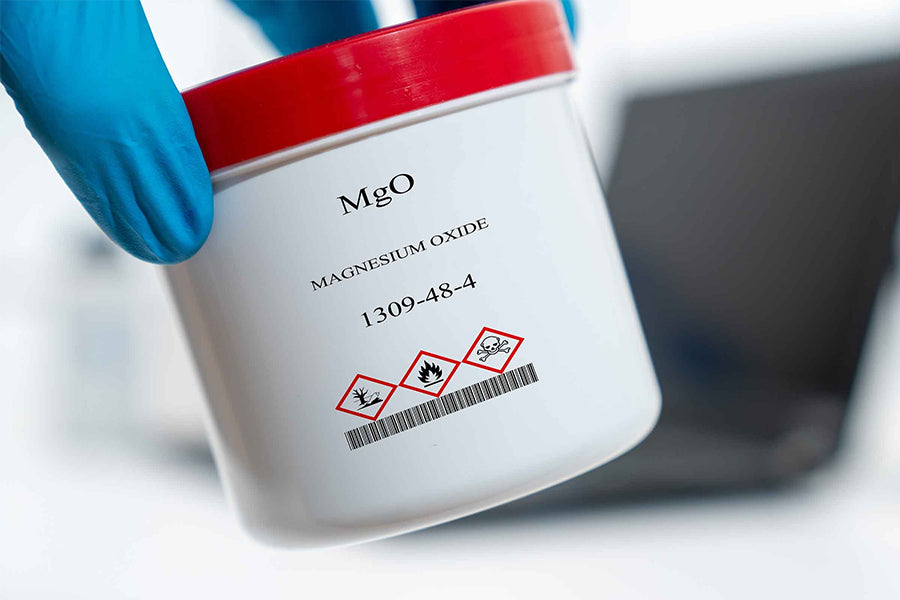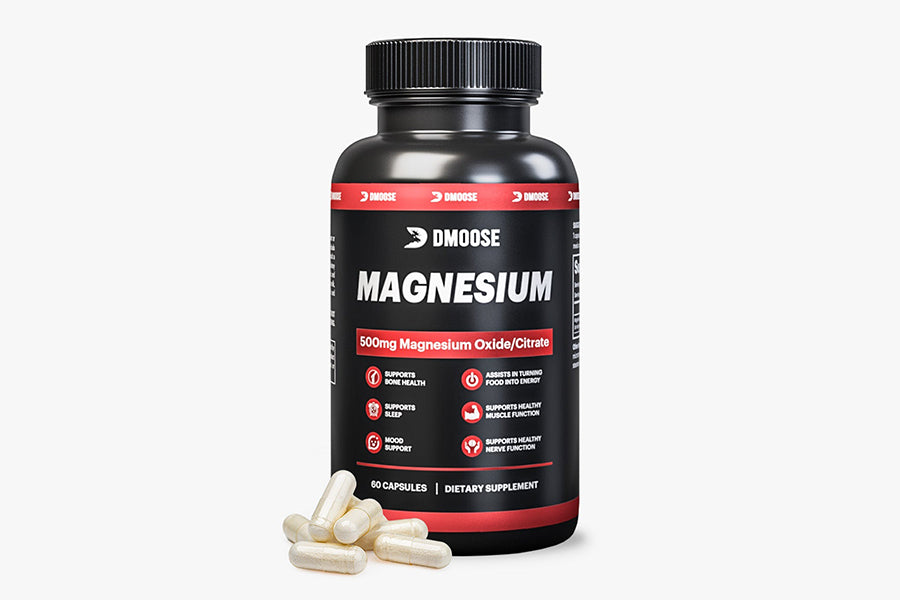Magnesium is one crucial mineral that often slips through the cracks in the hustle and bustle of modern life.
Despite its crucial role in more than 300 biochemical reactions within your body, magnesium often goes unnoticed in your daily wellness routines, which might surprise you.
From supporting muscle function to enhancing energy production and promoting bone health, the benefits of magnesium are nothing short of extraordinary.
Yet this essential mineral tends to be overshadowed.
But, not anymore!
It's time to shine a spotlight on magnesium and understand what magnesium is good for and how much it truly matters for your health and vitality.
So, let’s first discuss what magnesium is and what it does for the body.
What is Magnesium, and What Does it Do for the Body?

Magnesium is a vital mineral that your bodies need to function correctly.
It is crucial in over 300 biochemical reactions, ranging from muscle and nerve function to energy production and bone health.
Essentially, magnesium acts like a conductor, facilitating communication between different parts of the body to ensure smooth operation.
It helps muscles contract and relax, supports a healthy heart rhythm, and even regulates blood sugar levels.
Additionally, magnesium is essential for synthesizing proteins, DNA, and RNA, making it indispensable for overall growth and repair.
Side Effects of Magnesium Deficiency

Neglecting your body's need for sufficient magnesium can lead to a range of adverse effects on your health.
Let's explore the potential side effects of magnesium deficiency and understand why maintaining adequate levels of this essential mineral is crucial:
|
Side Effect |
Description |
|
Muscle Cramps |
Insufficient magnesium results in muscle discomfort, cramps, and spasms, affecting daily activities. |
|
Fatigue and Weakness |
Low magnesium levels can contribute to feelings of fatigue and weakness, impacting overall energy levels. |
|
Abnormal Heart Rhythms |
Magnesium plays a role in maintaining a healthy heart rhythm, and deficiency may lead to irregularities. |
|
Nausea |
Inadequate magnesium can contribute to digestive issues, potentially causing nausea and vomiting. |
|
Mood |
Magnesium deficiency has been associated with mood alterations, anxiety, and even depression. |
|
Impaired Bone Health |
Inadequate magnesium can compromise bone density, potentially contributing to osteoporosis. |
|
Insomnia and Sleep Disturbances |
Low magnesium levels may disrupt sleep patterns, leading to insomnia or restless nights. |
|
Headaches and Migraines |
Magnesium deficiency has been linked to an increased risk of headaches and migraines. |
10 Types of Magnesium - Which Magnesium is Best?

Not all magnesium supplements are created equal, and choosing the right type can significantly impact absorption and effectiveness.
The following are the types of magnesium. Let’s discover which is the best fit for your specific health needs:
1. Magnesium Citrate
Magnesium citrate is known for its high absorption rate, and it is often recommended for promoting bowel regularity and overall well-being.
2. Magnesium Glycinate
Gentle on the stomach, magnesium glycinate is an excellent choice for those looking to address magnesium deficiency without digestive discomfort.
3. Magnesium Oxide

While commonly used, magnesium oxide has lower absorption rates and may have a laxative effect, making it suitable for occasional use.
4. Magnesium Malate
Magnesium malate is a compound of magnesium and malic acid ideal for supporting energy production.
It is beneficial for those seeking enhanced vitality.
5. Magnesium L-Threonate
Recognized for its ability to cross the blood-brain barrier, magnesium L-threonate is believed to support cognitive function and brain health.
6. Magnesium Taurate

Suitable for cardiovascular health, magnesium taurate combines magnesium with the amino acid taurine, offering heart-protective benefits.
7. Magnesium Chloride
Often used in topical solutions, magnesium chloride can be applied to the skin to localize the relief of muscle cramps and tension.
8. Magnesium Sulfate (Epsom Salt)
Best known for external use in baths, Epsom salt provides a soothing and relaxing way to absorb magnesium through the skin.
9. Magnesium Aspartate

Magnesium aspartate is often included in sports supplements linked with improved exercise performance and muscle recovery.
10. Magnesium Stearate
Magnesium stearate is a common additive in pharmaceuticals and supplements, preventing ingredients from sticking together during manufacturing.
Choosing the best magnesium type depends on individual health goals, preferences, and potential sensitivities.
So, consulting with a healthcare professional for personalized recommendations is advisable.
Understanding the Dosage - How Much Magnesium is Too Much?

The correct dosage of magnesium varies based on factors such as age, sex, and overall health.
It's crucial to consider dietary sources and individual needs.
Taking 500mg of magnesium would be appropriate if you have a magnesium deficiency.
The excessive intake of magnesium can lead to diarrhea and gastrointestinal issues.
However, it's essential to consult with a healthcare professional to determine the right dosage based on your specific health conditions and any medications you may be taking.
They can provide personalized guidance to ensure optimal magnesium intake without adverse effects.
What Foods Have Magnesium?

1. Leafy Green Vegetables
- Spinach 79mg magnesium in 100g
- Swiss chard 81mg magnesium in 100g
- Kale 47mg magnesium in 100g
- Collard greens 33mg magnesium in 100g
2. Nuts and Seeds
- Almonds 268mg magnesium in 100g
- Cashews 292mg magnesium in 100g
- Pumpkin seeds 262mg magnesium in 100g
- Sunflower seeds 325mg magnesium in 100g
3. Whole Grains
- Brown rice 44mg magnesium in 100g
- Quinoa 197mg magnesium in 100g
- Oats 177mg magnesium in 100g
- Whole wheat 146mg magnesium in 100g
4. Legumes
- Black beans 160mg magnesium in 100g
- Chickpeas 48mg magnesium in 100g
- Lentils 36mg magnesium in 100g
5. Seafood
- Mackerel 97mg magnesium in 100g
- Salmon 22mg magnesium in 100g
- Halibut 70mg magnesium in 100g
6. Fruits
- Bananas 27mg magnesium in 100g
- Avocado 29mg magnesium in 100g
- Figs 68mg magnesium in 100g
7. Dairy Products
- Yogurt 32mg magnesium in 100g
- Milk 11mg magnesium in 100g
- Cheese
8. Dark Chocolate
High-quality dark chocolate 327mg magnesium in 100g
9. Vegetables
- Potatoes 23mg magnesium in 100g
- Beet greens 49mg magnesium in 100g
- Broccoli 21mg magnesium in 100g
10. Whole Food Snacks
- Trail mix with nuts and seeds
- Nut butter on whole grain bread or crackers
In addition to including these magnesium-rich foods in your diet, it's essential to maintain a balanced and varied diet to ensure overall nutritional well-being.
Magnesium Benefits For a Healthy Body

Magnesium offers a wide range of health benefits due to its crucial role in various biochemical processes within the body.
Some key benefits of magnesium include:
1. Improved Muscle Function
Magnesium is essential for proper muscle contraction and relaxation, contributing to overall muscle function and performance.
2. Improved Bone Health
Magnesium plays a vital role in bone formation and maintenance, promoting bone density and potentially reducing the risk of osteoporosis.
3. Energy Production

Magnesium is involved in the production of adenosine triphosphate (ATP), the body's primary energy currency, supporting overall energy metabolism.
4. Good Heart Health
Magnesium helps regulate heart rhythm and contributes to cardiovascular health, potentially reducing the risk of heart disease.
5. Nervous System Function
Magnesium is crucial for the proper functioning of the nervous system, aiding in neurotransmitter release and nerve signal transmission.
6. Blood Sugar Regulation

Magnesium plays a role in insulin function, helping regulate blood sugar levels and potentially reducing the risk of type 2 diabetes.
7. Relaxation and Sleep
Magnesium has calming effects and may help promote relaxation, contributing to improved sleep quality.
8. Mood and Stress Management
Adequate magnesium levels are associated with a positive impact on mood and may help alleviate symptoms of stress and anxiety.
9. Muscle Cramp Prevention

Magnesium supplementation may help reduce the frequency and severity of muscle cramps, particularly in conditions like exercise-induced cramps.
10. Migraine Relief
Some studies suggest that magnesium supplementation may be beneficial in preventing and reducing the frequency of migraines.
It's important to note that while magnesium offers numerous health benefits, however, excessive supplementation can lead to side effects.
Obtaining magnesium through a balanced diet rich in magnesium-containing foods is advisable.
Best Magnesium Supplement - DMoose Magnesium 500mg

If you need clarification about the wide variety of magnesium supplements and which should be picked, give DMoose Magnesium 500mg a try.
It contains 500mg of a combination of powerful ingredients encapsulated in vegetable capsules.
The carefully selected magnesium compounds aim to support various aspects of health, including muscle function and bone health.
So, order now and give your health the boost it needs now.
Key Ingredients: Vegetable Magnesium Stearate and Croscarmellose Sodium.
Type: Capsules
Dosage: 1 Capsule a day
Servings per Container: 60
Ideal for/Supports: Individuals seeking to support muscle function, bone health, and overall vitality.
Why DMoose Magnesium 500mg?
|
DMoose Magnesium 500mg |
Other Supplement |
|
Provides 500mg of magnesium per capsule |
Not suitable for those with ingredient allergies |
|
A balanced blend of Magnesium Oxide and Magnesium Citrate |
Not recommended for children without medical guidance. |
|
Vegetable capsules for easy consumption |
Needs daily use for best outcomes |
|
Faster dissolution and absorption |
|
|
Manufactured in an FDA-approved facility |
|
|
Supports muscle function and bone health |
|
|
Suitable for those with dietary restrictions |
FAQs
1. When to take magnesium for best results?
Magnesium supplements should be taken with a meal to enhance absorption, and for optimal effectiveness, consider dividing the dose throughout the day.
2. What type of magnesium should I take?
Consider magnesium citrate and stearate for better absorption, especially if aiming to address constipation.
3. How much magnesium per day is necessary for a woman?
Individual needs vary, so it’s better to consult with a healthcare professional who can provide personalized guidance.
4. What is magnesium glycinate suitable for?
Magnesium glycinate helps to support relaxation, alleviate muscle cramps, and aids in promoting better sleep.
Conclusion
Magnesium proves to be a vital mineral, often overlooked in our daily wellness routines.
Its benefits, ranging from muscle function to bone health and energy production, underscore its significance in maintaining overall well-being.
Neglecting magnesium intake can lead to various health issues.
Choosing the right magnesium supplement is crucial, and DMoose Magnesium 500mg stands out for its thoughtful formulation.
It is an ideal choice for those seeking to support muscle function, bone health, and overall vitality.
So, let’s boost your energy with this amazing supplement. Visit DMoose right now!








